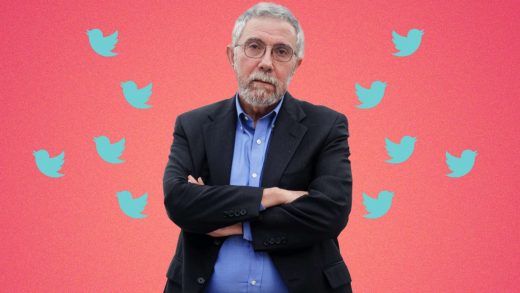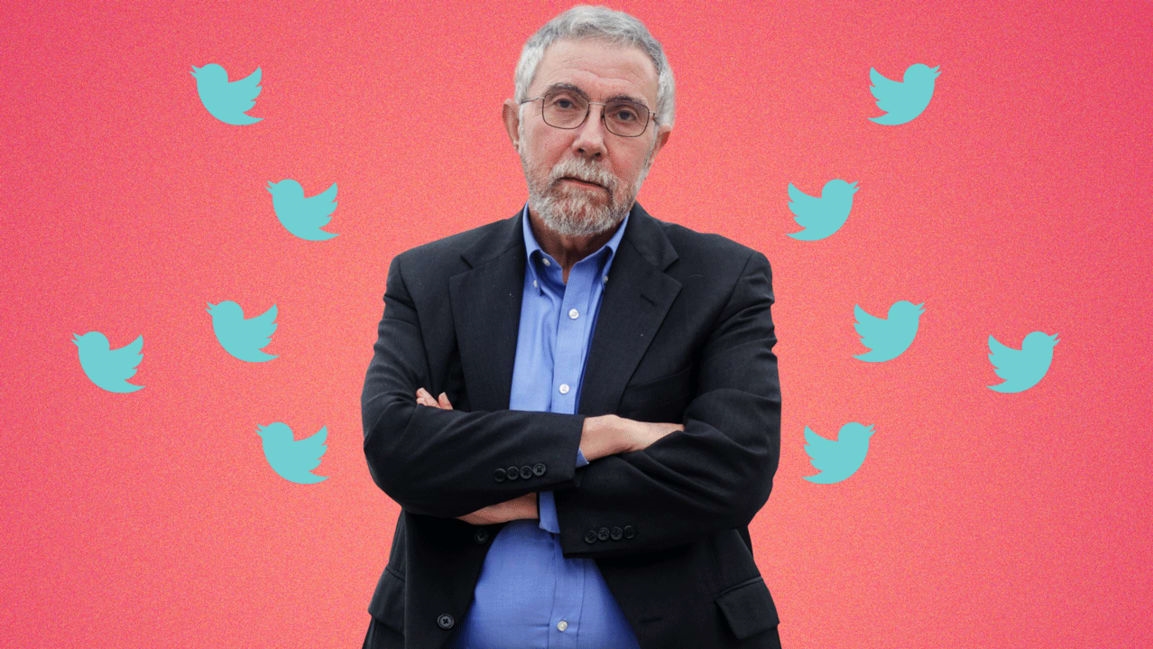New York Times writer Paul Krugman’s bad 9/11 tweets have united the country—against him
The wise prophet, uh, @MapleCocaine virally proclaimed last year, “Each day on twitter there is one main character. The goal is to never be it.”
As New York Times writer Sopan Deb points out, however, there is a fate worse than being Twitter’s designated villain on just your average Friday morning.
you never want to be the main character on twitter on any given day. but *definitely* not on 9-11.
— Sopan Deb (@SopanDeb) September 11, 2020
Deb isn’t just manufacturing a hypothetical here; rather, he is subtweeting his colleague, Nobel Prize-winning economist and op-ed columnist Paul Krugman, who sent Twitter into a frenzy on this tragic anniversary, with an ill-advised Twitter thread.
Although his six-tweet spree ends on the salient point that America has more to fear from white supremacists than foreign terrorists, Krugman takes a circuitous and rather ahistorical route to get there. Most notable is the tweet below, which has created such a massive uproar online today, it drowned out the ire surrounding Bush press secretary Ari Fleischer’s macabre annual minute-by-minute re-creation of 9/11.
Overall, Americans took 9/11 pretty calmly. Notably, there wasn’t a mass outbreak of anti-Muslim sentiment and violence, which could all too easily have happened. And while GW Bush was a terrible president, to his credit he tried to calm prejudice, not feed it 2/
— Paul Krugman (@paulkrugman) September 11, 2020
First of all, no.
Secondly, huh?
And perhaps most urgently, no again.
Krugman’s series of tweets, which arrived around the time of morning the planes struck the twin towers on that nightmare of a day, immediately spawned a multitiered backlash of epic proportions.
People were mad about the idea that Americans handled 9/11 “calmly.”
bloody hell, if ramping up the racist surveillance state and launching the Iraq War is ‘taking it calmly’ I’d hate to see them fly off the handle! https://t.co/bx2ZIXbDd2
— Philosophy Tube (@PhilosophyTube) September 11, 2020
yeah i’m really proud of America for responding to 9/11 by only starting two wars, establishing a massive surveillance complex, and covering the globe with black site prisons. https://t.co/Ytc5dIr7vA
— Law Boy, Esq. (@The_Law_Boy) September 11, 2020
calmly renaming french fries ‘freedom fries’ because france didn’t invade iraq https://t.co/i8N64zgw5d
— Stan (@tristandross) September 11, 2020
Calmly?
Laughs in two countries invaded, an entire region dragged into 20 yrs of war, the rise of ISIS & similar groups, millions of orphaned, widowed, dead, maimed, displaced, traumatized.
Real fucking calm. https://t.co/rAQTvuoYsv https://t.co/hTVINgDyug
— rabia O’chaudry (@rabiasquared) September 11, 2020
People took exception to the idea that George W. Bush tried to calm prejudice, rather than weaponize it to settle a perceived score with Iraq.
He created ICE. https://t.co/0L7Et4yU66
— Alex Kotch (@alexkotch) September 11, 2020
Yes, George W. Bush was certainly “calming prejudice” when his FBI rounded up, locked up, and abused nearly 800 Muslims after 9/11 (under director Robert Mueller) https://t.co/FY5EmykeWD
— Jordan (@JordanChariton) September 11, 2020
People were mad at Krugman’s whitewashing of history in suggesting that anti-Muslim prejudice didn’t run rampant through the U.S. at the time (and beyond).
Assuming Krugman is quoting a poorly- and hastily-written Zoomer term paper https://t.co/C889vOGk65
— Jaya Saxena (@jayasax) September 11, 2020
I’d argue the opposite. We’ve never truly addressed the collective trauma, understood the Why of it, or recovered from the national humiliation, which has rotted our spirit & politics since. I see a direct line from 9/11 to the desperate ego fantasy of “Make America Great Again.” https://t.co/S7uxyQ4iDn
— Dan Zak (@MrDanZak) September 11, 2020
The willful amnesia in this country is astounding. https://t.co/SHdBLsyqEW
— Waleed Shahid (@_waleedshahid) September 11, 2020
Now why are you lying like we weren’t all there???? There was a HUGE “outbreak” of anti-Muslim sentiment & didn’t that kick off what Faux News is today??? 9/11 then Obama running & Faux News (and other networks) being racist…got us to the current maniac in the WH. https://t.co/YSHzpKhCxa
— Reagan Gomez (@ReaganGomez) September 11, 2020
Some people touted reportage proving Krugman’s claims to be deeply inaccurate.
Paul, this is wrong. It started that very day. Across the country. And by our govt. Also pls read @valariekaur’s See No Stranger to learn abt the deadly wave of anti-Sikh violence (b/c the perpetrators didn’t know/care to know the difference bet Sikhs & Muslims) 9/11 unleashed. https://t.co/ocalnfY2UC
— Sherrilyn Ifill (@Sifill_LDF) September 11, 2020
???? pic.twitter.com/yoV5imc2eL
— marshlands (@marshlands) September 11, 2020
Even heroes of 9/11 were not spared. A Sikh MTA subway conductor in NYC who physically pushed his train to prevent it from going toward the World Trade Center – saving so many lives – was then segregated by the MTA & made to work away from the public bc of his turban & beard. https://t.co/jOPUFbYipp
— Jo Kaur (@SikhFeminist) September 11, 2020
the number of anti-Muslim hate crime incidents jumped in 2001, from 28 to 481 incidents, according to FBI data. The number dropped in the following years, but has never returned to levels reported before the 9/11 attacks. chart via @PRI: https://t.co/sArvas5N5q pic.twitter.com/AHSw3LcMeY
— Tori Bedford (@Tori_Bedford) September 11, 2020
Most heartbreaking, however, was the mass outpour of tweeted testimonials about lived experience from the time period in question.
Notably, my parents had to pull me out of my majority-muslim private school in 2001 because of daily anti-Muslim protests, multiple BOMB threats, and a general societal pressure to assimilate or face the consequences of prejudice. But you’re right, overall pretty calm. https://t.co/b3f8cUCykl
— Ramy Tsunami ???????????? (@ramyzab) September 11, 2020
My mosque burned down https://t.co/uUiWEWta2X
— Zara Rahim (@ZaraRahim) September 11, 2020
A bunch of men waited outside the women’s entrance of our mosque and said they were going to rape us. I was 7 and didn’t even know what the word meant. https://t.co/kpKUfIuRif
— rahima (@rararahima) September 11, 2020
I was 10 years old in the 5th grade at PS 230 in Kensington, Brooklyn. Everything after 9/11 was predicated on me being Muslim. 10 year old me knew I had to protect my Muslim community in NYC. Didn’t think it would be a lifelong project. And honestly, fuck you. https://t.co/ym1aerm732
— Shahana Hanif (@ShahanaFromBK) September 11, 2020
My brother would be detained at American airports for hours at a time. He was 13. My mother would sob and beg him not to anger those interrogating him. She feared he would be taken to Guantanamo Bay.
Fuck you, Paul. You lying sack of shit. https://t.co/ELhL4DyLiM
— Aisha Ahmad (@aishaismad) September 11, 2020
I am a New Yorker. 19 years ago, as a small child, my second memory – after being called a slur an hour after it happened – was of our masjid praying for a Hindu auntie in our area who was taken for Muslim, and run over.
This is why I hate the NY/America came together narrative. https://t.co/kAmDFOpniA
— Sailor Mer(Kaye)ry (@gildedspine) September 11, 2020
I couldn’t go by my full name, Mohammed, for like three years afterwards. And I was 6 years old when it happened. But sure man, there wasn’t any of that https://t.co/wgjM7FMTbC
— Moh (@LessIsMoh) September 11, 2020
ask any brown kid with a foreign name what going to school post 9/11 was like https://t.co/cr50QRVYO8
— Rawan (@rawan) September 11, 2020
Perhaps most galling of all, though, is the idea that Krugman isn’t downplaying the actual aftermath of 9/11 in service of a great point, but rather that he (and perhaps many others) have internalized his fictitious interpretation, and that it’s helped shaped his worldview altogether.
Now, imagine how the bias displayed in this thread has manifested throughout his previous work. https://t.co/WmR54E4XL1
— Jehmu Greene (@Jehmu) September 11, 2020
Fast Company will update this story if and when Krugman responds to the backlash.
Fast Company , Read Full Story
(35)



